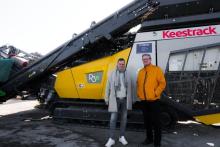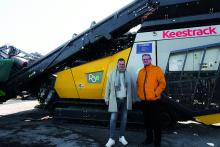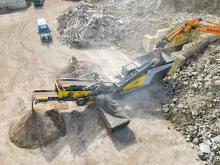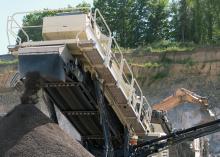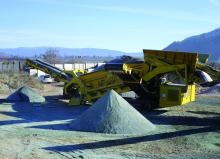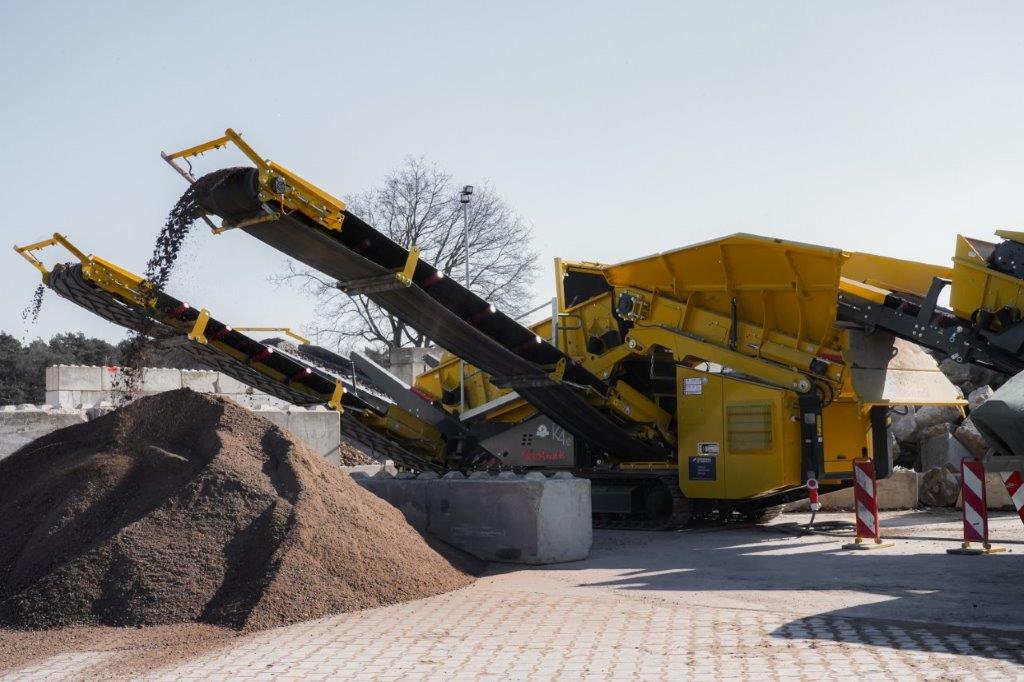
Büscher claims to be the first company in the world to build a complete house out of 75% recycled construction and demolition waste. The load-bearing and non-load-bearing interior wall elements are made of 100% recycled aggregates.
In June 2021, Büscher became the only company in Germany to receive general building approval (abZ) from the German Institute for Building Technology (DIBt) for load-bearing and non-load-bearing interior wall elements made of recycled concrete with a 100% natural stone substitute. In the prefabricated parts, the raw materials gravel and sand are completely replaced by mixed demolition material.
The company's choice to use Keestrack crushing and screening equipment is also driven by its comittment to sustainability. Oppermann & Fuss, the Keestrack dealer in Germany advised Büscher which ZERO equipment was the best fit for its applications and capacity at its recylcing site.
As the Büscher site is equipped with solar panels delivering up to 323 kW/h of renewable electricity it is used to power the concrete factory but also to the Keestrack R3e ZERO impact crusher and the K4e ZERO screen. Both Keestrack machines are fully electric powered by renewable energy and do not have a combustion engine onboard.
As the electric motors drive most of the mobile crushing and screening equipment and power some necessary hydraulics systems both Keestrack machines run with ZERO CO2 emission. Keestrack is known being an innovator and early adopter for electric e-driven equipment, and the majority of the Keestrack product range is available in ZERO-drive.
When plugged in to the grid, like at the Büscher recycling site, where they use renewable energy using photovoltaic solar panels, the R3 and K4 are producing at zero carbon emission. The energy cost will be approximately 152kWh. Operational and maintenance cost will decrease drastically as there is no engine on board to maintain.
The innovative technology, its safety features and the design of the R3 impact crusher has won several European design prices, one of them being the Red Dot award. The very compact and easy to transport impact crusher available in; diesel/hydraulic drive , electric plug-in drive (with onboard backup diesel gen-set) and ZERO drive: full electric plug-in without gen-set backup, has a capacity up to 250t/h.
The R3e ZERO is equipped with a vibrating feeder with a pre-screen of 1.200mm x 920mm to optimize crushing results and to minimize wear, an inlet opening of 770mm x 960mm (HxW) and a rotor diameter of 1.100mm and a rotor width of 920mm. The crusher equipped in closed circuit with recirculation conveyor and a precession screen of 3.100mm x 1.400mm produces a defined aggregate product size. The installed wind sifter eliminates contaminations of plastics, wood or paper and the overband magnet separates the metals. The R3e ZERO weighs 32t, and its plug-out of 125A, powers the connected K4e ZERO of 28t.
The K4e ZERO, has a high productivity with a capacity up to 350t/h. The double deck screen box of 4.200mm x 1.500mm, standard heavy duty plate apron feeder and hydraulic adjustable screen angle gives it very good screening capabilities. The numerous available options and screen decks make the K4 suitable for each job. At the recycling site of Büscher they choose to have the fine and middle fraction conveyor at the same side of the screen to improve the accessibility for the wheel loader.
Both Keestrack machines at Büscher are equipped with remote controls to operate the crusher and screen from the excavator. They both have an integrated water spray system which can be used in case the production is too dusty. Also both are equipped with a Keestrack-er UMTS system. This telematics software system provides real-time data and analytics. The system enables you to check the location of the machines and if they are working correctly. All aspects of a machine can be checked and if necessary, remote updates to the software can be made. It is possible to run diagnostic tests for all components including the feeder, screen, crusher and conveyors. The Keestrack-er also functions well for maintenance planning by Oppermann & Fuss, helping to keep machines in optimum shape.
Company co-owner Wolfgang Büscher says that getting 100% prefab concrete certified was difficult, and took the company eight years of research & development to approval. “Concrete specialists, laboratories and certification specialists were very doubtful this could be done. They all said it is impossible and not legal”, says Büscher.
Büscher asked researchers from laboratories and universities to scientifically prove what the material is capable of, and what it’s not. They gave the parameters on what they wanted to achieve with the material and let them research if it stands the tests.
“By now all scientific research has been done and it shows exactly what is possible with the 100% recycled prefab concrete and concrete elements. The new material functions perfect and the recipe has changed at Büscher” says Hans-Jürgen Büscher, Wolfgang's brother and company co-owner.

